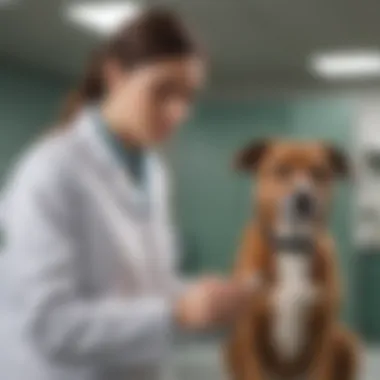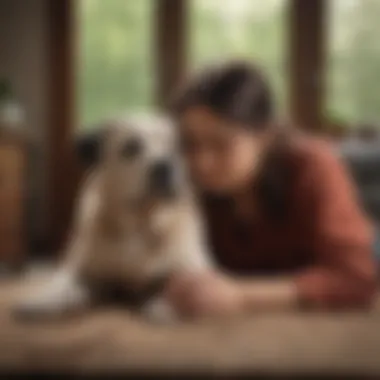Essential Care for Dogs with Diarrhea: A Pet Owner's Guide


Intro
Diarrhea in dogs can be a distressing experience for both the pet and its owner. It may result from dietary indiscretion, infections, or underlying health conditions. Understanding how to effectively care for dogs experiencing this unpleasant condition is crucial for their recovery. This article seeks to equip pet owners with the informative tools necessary for navigating this common health issue, covering everything from identifying potential causes to dietary adjustments and knowing when to seek veterinary assistance.
Understanding Your Pet
Breed Traits
The breed of a dog can significantly affect its health and susceptibility to digestive issues, including diarrhea. For example, certain breeds like the Dachshund and the Boxer are more prone to gastrointestinal issues due to their unique anatomical structures. Knowing the specific traits of your dog's breed can help you anticipate potential problems and take preventive measures.
Common Temperaments
Dogs exhibit various temperaments that can influence their eating habits and stress levels. For instance, anxious or overly excitable dogs may be more prone to gastrointestinal upset. Understanding your dog's temperament allows you to create an environment that minimizes stress, reducing the likelihood of digestive disturbances.
Special Needs
Some dogs may have specific dietary needs or allergies that can lead to diarrhea. For instance, dogs with food sensitivities might react poorly to certain ingredients. Recognizing these special requirements is essential for tailored care, as it helps you make informed decisions about their nutrition and overall health.
Immediate Care
When a dog experiences diarrhea, the owner should remain calm and take immediate steps to assess the situation. Checking for accompanying symptoms, such as vomiting or lethargy, is crucial in determining the severity of the condition. Keeping the dog hydrated is of utmost importance, as diarrhea can lead to dehydration quickly.
Dietary Adjustments
In the aftermath of diarrhea, consider adjusting your dog's diet to aid recovery. This may include temporarily switching to a bland diet consisting of boiled chicken and rice or a veterinary-prescribed gastrointestinal diet. Monitoring the dog’s response to these changes is key, and it is important to reintroduce regular foods gradually.
When to Seek Veterinary Assistance
If diarrhea persists for more than two days or is accompanied by other concerning symptoms, veterinary consultation is advised. Signs that warrant immediate professional help include severe lethargy, blood in stool, or significant weight loss. Timely intervention can prevent more serious health complications.
Preventive Measures
Preventing diarrhea in dogs often involves several key strategies:
- Maintain a consistent diet: Avoid sudden changes in food that can upset digestion.
- Promote regular exercise: Physical activity aids digestion and overall health.
- Practice good hygiene: Ensure your dog's food and water bowls are clean to minimize exposure to pathogens.
Understanding Canine Diarrhea
Understanding canine diarrhea is crucial for pet owners. Recognizing why a dog may experience this condition can lead to timely and effective interventions. Diarrhea can be an indicator of various underlying issues, ranging from minor to severe. Addressing this problem is essential for maintaining a dog’s overall health and well-being.
Definition and Implications
Canine diarrhea is defined as an increase in the frequency, wateriness, or volume of bowel movements in dogs. It may be acute or chronic. Acute diarrhea arises suddenly and often resolves quickly, while chronic diarrhea persists for more than a few weeks. This condition can lead to significant issues, including dehydration, nutritional deficiencies, and stress on both the dog and the owner.
The implications of untreated diarrhea can range from mild discomfort to serious health risks. When a dog loses fluids rapidly, dehydration can occur. This situation requires immediate attention. Pet owners should be alert to the signs and symptoms to ensure that they respond appropriately.
Common Causes of Diarrhea in Dogs
Dietary indiscretion
Dietary indiscretion refers to a dog's tendency to consume inappropriate items. This behavior can include scavenging, eating spoiled food, or ingesting non-food items. Such behavior is a significant contributor to diarrhea. The key characteristic of dietary indiscretion is its unpredictability. Pet owners may find this aspect especially relevant when observing sudden changes in their dog’s stool.
Dietary indiscretion often results in acute diarrhea. The consequences of this choice can lead to discomfort for the dog. It can also lead to additional medical expenses in trying to manage the condition.
Food allergies
Food allergies might trigger diarrhea as well. Certain ingredients, such as beef, chicken, or grains, can cause adverse reactions in dogs. This situation is particularly important for owners who transition their pet to new diets or introduce new treats. The characteristic feature of food allergies is their delayed response, which can lead to recurring diarrhea episodes over time.


Food allergies are notable for their long-term management. Identifying the offending ingredient may require a process of elimination, which can be complex and time-consuming. While navigating allergies is challenging, they can often be managed with careful dietary monitoring.
Infections
Infections are another common cause of diarrhea in dogs. They may stem from bacteria, viruses, or parasites. Canine parvovirus and canine distemper are viral infections that can lead to severe gastrointestinal distress. The characteristic of infections is their potential to spread, especially in environments with multiple dogs.
Recognizing an infection early is beneficial for treatment outcomes. These conditions may require medical intervention such as antibiotics or vaccinations, based on the situation. Monitoring a dog's health closely can assist in determining when a vet visit is necessary.
Parasites
Parasites, such as hookworms and Giardia, can cause diarrhea in dogs. They inhabit the digestive tract and can disrupt normal absorption of nutrients. The distinctive characteristic of parasites is their silent presence until symptoms emerge. This adds complexity to understanding why a dog might develop diarrhea suddenly.
Dealing with parasites often involves routine fecal examinations and fecal treatments. Awareness of this cause is vital. Preventive measures can significantly lower the risk of parasite-related diarrhea.
Underlying health conditions
Underlying health conditions can complicate the issue of diarrhea. Conditions like inflammatory bowel disease or pancreatitis may result in digestive disturbances. The key characteristic is that these conditions often require veterinary diagnosis and long-term management.
Understanding the possibility of underlying health issues can guide owners to seek veterinary advice. Addressing these conditions proactively is essential, as they may present more serious concerns for a dog's health. Identifying specific signs can aid in recognizing when a check-up is necessary.
Signs and Symptoms to Monitor
Understanding the signs and symptoms of diarrhea in dogs is crucial for effective care. Monitoring these aspects can help detect the severity of the condition and aid in making informed decisions about treatment. Recognizing these signs early can significantly impact the health outcomes for the dog.
Identifying Diarrhea
Diarrhea is characterized by an increase in the frequency of bowel movements, where the stool becomes loose or watery. It’s important to check not only the consistency but also the dog’s behavior around elimination. A common method for pet owners is to observe their dog’s stool during walks. Keeping track of changes in stool consistency can direct the owner toward identifying potential health issues.
Key considerations include:
- Frequency: More than two to three bowel movements in a day can be considered diarrhea.
- Consistency: Compared to normal, if stool feels more liquid or mushy, this indicates diarrhea.
- Behavior: Increased urgency may be present when a dog needs to go outside.
Accompanying Symptoms
Vomiting
Vomiting is a common condition that can occur alongside diarrhea. The presence of vomit can indicate a more serious issue affecting the dog's gastrointestinal system. It may suggest that the dog is reacting negatively to food or has ingested something harmful. Monitoring vomiting is necessary as it can lead to dehydration quickly.
Key characteristics include:
- Timing: Vomiting before diarrhea strikes may signal an acute problem.
- Contents: The presence of blood or bile in the vomit elevates the urgency for veterinary consultation.
Lethargy
Lethargy can accompany diarrhea and could signify the overall well-being of the dog. If the dog appears unusually tired or lacks energy, it may signal further medical issues. Behavioral observations are important here. A dog that is not interested in play or walks is a cause for concern.
Key aspects include:
- Comparison: An owner's knowledge of their dog's normal activity level is essential for understanding the context of lethargy.
- Duration: Ongoing lethargy raises concern for dehydration or an underlying infection.
Change in appetite
When a dog experiences diarrhea, changes in appetite are often noticeable. A reduction or complete lack of interest in food could indicate digestive distress. Understanding the normal eating habits of a dog helps owners identify when something is amiss. In some cases, dogs may seek specific foods or show preferences for bland items, reflecting a natural instinct to self-regulate.
Key points are:
- Duration: A short-term loss of appetite after experiencing diarrhea is often normal; however, prolonged changes require investigation.
- Types of Food: Owners might notice that their dog prefers bland diets during recovery phases.
Dehydration signs
Dehydration can occur rapidly in dogs with diarrhea, making it critical to monitor hydration levels. Key indicators include dry gums and sunken eyes, along with less urine output. Observing the skin's elasticity can also provide insight into hydration levels: a quick pinch of skin that does not return to its place indicates possible dehydration.
Important characteristics:
- Assessment: Checking for these signs regularly can help prevent severe dehydration.
- Response: Encouraging fluid intake, either through water or electrolytes, can help mitigate dehydration risks.
Frequent monitoring of these signs and symptoms ensures that pet owners remain informed about their dog's health status, allowing timely interventions.
Immediate Care for Your Dog
Immediate care for dogs with diarrhea is crucial and serves as the first line of defense against severe dehydration and discomfort. Diarrhea is not just an inconvenience, it can lead to serious health issues if left unattended. The importance of prompt action can’t be overstated. Timely measures can significantly improve recovery time and overall well-being. Therefore, knowing how to provide immediate care is essential for every pet owner.
First Steps to Take
When you notice your dog has diarrhea, take these first steps to provide immediate relief:


- Assess the Situation: Determine how severe the diarrhea is. Check if there are any additional symptoms like vomiting or lethargy. This can give you critical information on your dog’s condition.
- Withhold Food Temporarily: For about 12 to 24 hours, it’s generally recommended to withhold food. This allows the digestive system to rest and recover. However, ensure they have access to fresh water during this time.
- Introduce a Bland Diet Gradually: After the fasting period, reintroduce food slowly. Start with a bland diet, such as boiled chicken and white rice. Gradually increase amounts as your dog shows signs of improvement.
Monitoring Hydration
Hydration is one of the most important aspects of caring for a dog with diarrhea. Dehydration can occur quickly and can have serious consequences. Monitor your dog's water intake and look for signs of dehydration.
- Offer Plenty of Water: Ensure your dog has constant access to fresh water. Hydration supports the recovery process and helps maintain electrolyte balance. If your dog refuses to drink, consider offering ice chips or using a syringe without a needle to administer small amounts of water.
- Check for Dehydration: Look for signs, which can include dry gums, sunken eyes, and lethargy. If you suspect dehydration, seek veterinary assistance immediately.
Remember: Keeping your dog hydrated is crucial. Diarrhea can lead to significant loss of fluids.
Establishing a routine to monitor hydration can help prevent severe health issues. Immediate care must focus on not only alleviating the symptoms but also ensuring your pet remains hydrated and comfortable.
Dietary Considerations for Recovery
Dietary considerations play a crucial role in the recovery of dogs experiencing diarrhea. The right nutrition can help restore balance in the gastrointestinal tract. Adopting specific dietary practices can greatly influence the healing process and overall digestive health. It is important to understand the need for a careful approach when choosing what your dog should eat during recovery.
Temporary Dietary Changes
Implementing temporary dietary changes is essential when a dog suffers from diarrhea. This approach involves shifting from the regular diet to something that's easier on the stomach. It may include smaller, more frequent meals rather than large servings. The objective is to reduce strain on the digestive system while still providing necessary nutrients.
Consider avoiding fatty foods, or those with high fiber content during this period. It's about creating a balance that promotes recovery rather than further irritation.
Recommended Foods
Bland diet options
Bland diet options are often recommended for dogs with diarrhea. This diet is characterized by simple, easily digestible ingredients. Common examples include boiled chicken and white rice. The main advantage of these foods is their non-irritating nature, which allows the gut to heal without added stress.
Bland diets minimize further gastrointestinal upset while helping in the absorption of nutrients. They are a beneficial choice during recovery because they provide essential energy while being gentle on the system. However, it is necessary to keep bland diets in moderation. Extended use without nutritional variety can lead to deficiencies.
Probiotics for gut health
Probiotics play a significant role in promoting gut health during recovery. These supplements introduce beneficial bacteria to the digestive system. The key characteristic of probiotics is their ability to restore the natural flora that may be disrupted during episodes of diarrhea.
They are popular among pet owners as a supportive measure for recovery. By reinforcing gut health, probiotics can enhance digestion and improve nutrient absorption. The unique feature of probiotics is that they can also help in preventing future digestive issues. However, it is always good to consultation with a vet before starting any supplement.
It is essential to carefully assess dietary changes and consider your dog's specific condition. Flexible but informed choices can greatly benefit your dog's recovery process.
Overall, understanding these dietary considerations can assist in crafting a recovery plan that is both effective and responsible.
When to Consult a Veterinarian
Consulting a veterinarian is a crucial step when caring for a dog with diarrhea. This health issue, while common, can indicate more serious underlying conditions that may require professional intervention. Pet owners need to understand the specific signs that warrant a visit to the vet. Recognizing these signals can be the difference between quick recovery and prolonged distress for the dog. Additionally, engaging with a veterinarian promptly can prevent more severe health issues that may emerge from untreated diarrhea.
Recognizing Serious Symptoms
Not all cases of diarrhea necessitate a veterinarian's attention. However, pet owners should be alert to serious symptoms that indicate a more significant problem. Look for:
- Persistent diarrhea lasting more than 24 hours.
- Blood in stool, which can be a sign of severe infections or gastrointestinal disturbances.
- Severe vomiting accompanying diarrhea, suggesting a more complex condition.
- Excessive lethargy or weakness, indicating dehydration or other health issues.
- Signs of dehydration, like dry gums or a lack of skin elasticity.
If any of these symptoms are present, contacting a veterinarian is vital. Early intervention can lead to better outcomes and a quicker recovery for the dog.
Understanding Treatment Options
When a veterinarian is consulted, they will likely discuss various treatment options based on the specific diagnosis. Treatment may include medications, fluid therapy, or further diagnostics to understand the underlying cause of diarrhea.
Medication


Medication is often a key component in treating diarrhea in dogs. It can target specific issues, such as infections or inflammation. These medications can alleviate symptoms and facilitate healing. A commonly used medication is metronidazole, which is effective against certain intestinal parasites and infections.
One key characteristic of medications like metronidazole is their dual function; they combat both bacterial and protozoal infections. However, some dogs may experience side effects like nausea or loss of appetite. It’s essential to weigh the benefits against potential drawbacks when considering medications for your dog.
Fluid therapy
Fluid therapy is another significant treatment method for dogs suffering from diarrhea. This approach aims to restore hydration, especially in cases of severe fluid loss. Administering fluids can help rapidly correct dehydration levels and maintain electrolyte balance.
The key characteristic of fluid therapy is its immediate impact on a dog's overall well-being. It can significantly reduce the risk of complications associated with dehydration and maintain stability during recovery. However, this treatment generally requires veterinary supervision, especially if intravenous fluids are needed, as improper administration can cause further issues.
Further diagnostics
If initial treatments do not yield improvement, further diagnostics may be necessary to identify underlying health problems. This might involve blood tests, imaging, or fecal examinations. The primary goal of diagnostics is to establish a clear cause for the diarrhea.
The benefit of further diagnostics lies in their ability to pinpoint conditions that may not be evident through physical examinations alone. Testing can reveal serious underlying diseases such as pancreatitis or inflammatory bowel disease. However, diagnostic procedures can be costly and time-consuming, and they may cause stress to the dog, which needs to be considered by pet owners.
Engaging with your veterinarian early can significantly impact the health outcomes and recovery speed of your dog experiencing diarrhea. Take note of any alarming symptoms and seek professional help as needed.
Preventive Measures Against Diarrhea
Preventing diarrhea in dogs is essential for maintaining optimal health. Understanding how to prevent this issue helps owners ensure their pet's well-being. By implementing preventive measures, owners can minimize the risk of occurrences, which can lead to serious health complications if not addressed promptly.
Routine Healthcare Practices
Routine healthcare is a cornerstone in the prevention of canine diarrhea. Regular vaccinations protect dogs from infectious diseases that can cause gastrointestinal issues. Additionally, maintaining a consistent schedule for flea and tick control can prevent infections that result from parasites.
Regular dental check-ups also contribute significantly to overall health. Poor dental hygiene can lead to digestive problems in dogs. Therefore, owners should prioritize dental care as an integral part of their pet's health regimen.
Other routine practices include monitoring the dog's weight and maintaining a healthy body condition. Obesity can predispose dogs to various health issues, including digestive disorders. Owners should work closely with their veterinarians to assess weight and diet regularly.
Maintaining a Balanced Diet
A balanced diet is vital in preventing digestive upset in dogs. Providing high-quality dog food that meets specific nutritional needs is essential. This includes essential fatty acids, adequate protein, and essential vitamins and minerals. Avoid sudden changes in diet, as they can disrupt a dog's digestive system. Gradual transitions to new food can help prevent diarrhea.
Key considerations in maintaining a balanced diet include:
- Selecting a dog food appropriate for the dog's age and health condition.
- Avoiding table scraps and human food, which can lead to dietary indiscretion.
- Incorporating fiber into the diet can help maintain digestive health.
Supplementing with probiotics may also support gut health. Probiotics can enhance the balance of gut flora, helping in digestion and overall health.
Regular Vet Check-Ups
Regular veterinary check-ups are crucial for proactive health management. These visits allow for early detection of potential issues that could lead to diarrhea, such as underlying health conditions. During vet visits, diagnostic tests can be performed, and proper vaccinations can be administered.
Owners should schedule annual visits for healthy dogs and more frequent visits for older dogs or those with preexisting conditions. This proactive measure helps build a strong healthcare foundation for pets. The connection between preventive care and maintaining digestive health cannot be overstated.
Regular vet check-ups can catch problems early, preventing more serious conditions from developing later.
Ending
As discussed throughout this article, the care of dogs experiencing diarrhea is a critical aspect of pet ownership that should not be overlooked. Understanding the factors that contribute to diarrhea, recognizing the symptoms, and implementing immediate and preventive measures can significantly improve your dog's health and well-being.
The importance of prompt action cannot be understated. Delaying proper care could lead to more severe health problems, including dehydration or serious medical conditions. Therefore, it’s crucial to monitor your dog closely and consult a veterinarian when needed.
Summary of Key Points
To summarize the main points discussed:
- Understanding Diarrhea: Recognize the definition and implications to identify the severity and causes effectively.
- Signs and Symptoms: Focus on monitoring your dog for accompanying symptoms such as vomiting, lethargy, or dehydration which can indicate a serious problem.
- Immediate Care: Take prompt action and ensure your dog stays hydrated. Adjustments to their diet can also aid in recovery.
- Veterinary Assistance: Know when to consult a veterinarian based on symptom severity and duration of diarrhea.
- Preventive Measures: Maintain routine health checks, a balanced diet, and ensure all vaccinations and parasite control are up to date.
Final Thoughts on Canine Digestive Health
Maintaining your dog's digestive health requires ongoing commitment. Regularly evaluating their diet and recognizing the signs of distress can prevent many common issues. Keeping your dog on a consistent feeding schedule and monitoring changes in their behavior or health is vital.
A proactive approach is the best defense against more serious health issues.
Engaging a veterinarian for routine check-ups and being open to adjustments in care can enhance your dog's quality of life. Ultimately, being informed and prepared sets the foundation for a healthier canine companion.



